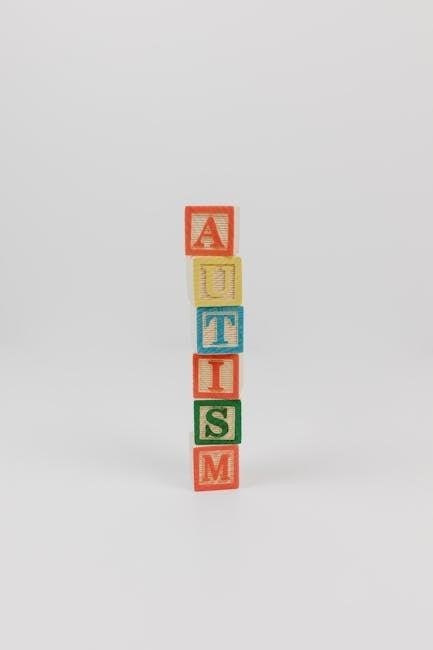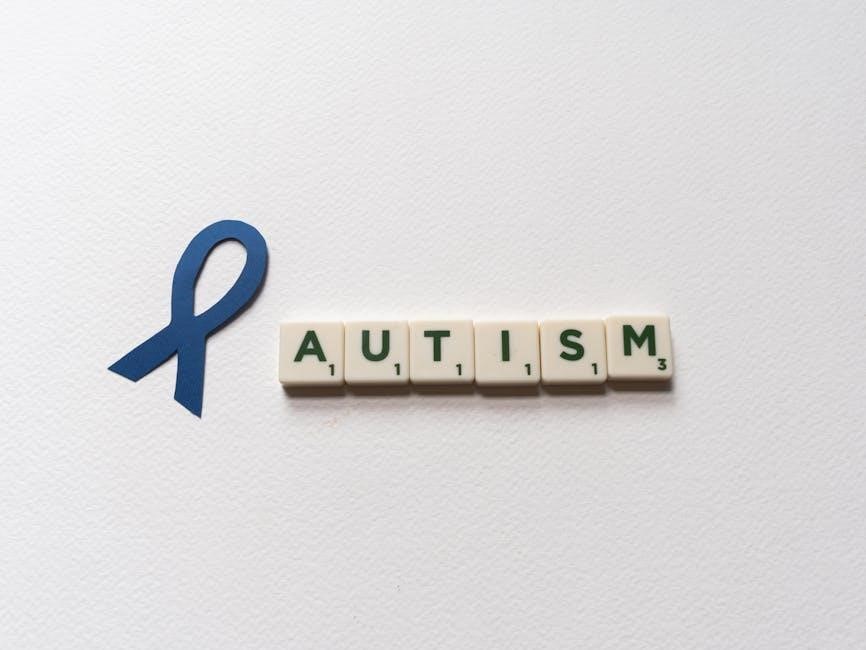
Life skills are essential for individuals with autism to gain independence, confidence, and participation in society. They empower individuals to navigate daily challenges effectively and confidently.
1.1 Understanding the Importance of Life Skills for Individuals with Autism
Life skills are vital for individuals with autism to achieve independence, confidence, and active participation in society. They enable effective navigation of daily challenges, fostering self-reliance and emotional well-being. These skills, including communication, self-care, and social interactions, are crucial for personal growth and reducing reliance on caregivers. Tailored support and strategies ensure each individual’s unique needs are met, promoting a fulfilling life.
Key Areas of Life Skills Development
Life skills development focuses on communication, daily living, emotional regulation, and social interactions, fostering independence and confidence in individuals with autism.
2.1 Communication and Social Interaction Skills
Communication and social interaction skills are vital for individuals with autism to build relationships and navigate social situations. Strategies include using visual supports, role-playing, and structured activities to enhance understanding and expression of emotions, fostering meaningful connections and improving overall social confidence. These skills are foundational for personal growth and community integration.
2.2 Daily Living Skills and Independence
Daily living skills, such as self-care, cooking, and money management, are crucial for independence. Teaching these skills through structured routines and practical exercises helps individuals with autism manage everyday tasks confidently. These abilities foster self-reliance, reduce dependency, and enhance overall quality of life, enabling individuals to thrive in various environments. Consistent practice and support are key to mastery.
2.3 Emotional Regulation and Coping Mechanisms
Emotional regulation is vital for individuals with autism to manage stress and challenging situations. Teaching coping mechanisms, such as deep breathing, visualization, and sensory integration, helps them navigate emotional turmoil. Tailored strategies and consistent practice enable better control over emotions, fostering resilience and a positive outlook. A supportive environment and understanding of individual triggers further enhance these skills.

Teaching Life Skills at Home
Teaching life skills at home involves assessing strengths, creating a supportive environment, and practicing routines. These strategies foster independence and confidence in individuals with autism.
3.1 Assessing the Individual’s Strengths and Challenges
Assessing strengths and challenges helps tailor learning strategies to the individual’s needs. Understanding their abilities and difficulties allows parents and educators to create personalized plans, fostering growth in life skills development for autism. This step ensures a focused approach, addressing specific areas while building on existing strengths.
3.2 Creating a Supportive Learning Environment
A supportive learning environment is crucial for effective life skills development. This involves creating a structured, safe space with clear expectations and visual schedules to reduce anxiety. Positive reinforcement and sensory-friendly adjustments can enhance engagement. Tailoring the environment to the individual’s needs and interests fosters a conducive atmosphere for learning and growth.
3.3 Practicing Skills Through Routine and Repetition
Routine and repetition are key to mastering life skills for autism. Consistent practice helps build confidence and independence. By incorporating daily routines, individuals can gradually internalize new skills. Repetition reinforces learning, making complex tasks manageable over time. This structured approach ensures steady progress and long-term retention of essential abilities.

Educational and Academic Strategies
Educational strategies for autism focus on tailored approaches to learning, ensuring students thrive academically and socially. Individualized plans and inclusive methods create a supportive environment for growth.
4.1 Developing Individualized Education Plans (IEPs)
IEPs are tailored plans that address the unique academic, social, and behavioral needs of students with autism. They involve collaboration among teachers, parents, and specialists to set measurable goals, ensuring personalized support and fostering inclusive education. Regular assessments and adaptions ensure the plan remains relevant and effective in promoting the student’s growth.
4.2 Incorporating Inclusive Pedagogy in the Classroom
Inclusive pedagogy ensures all students, including those with autism, receive equal opportunities to learn. By adapting teaching methods, using visual aids, and promoting a supportive environment, educators create a space where diverse needs are met. This approach fosters social interaction, academic engagement, and emotional well-being, preparing students for future challenges.
4.3 Using Visual and Practical Approaches for Learning
Visual and practical approaches are highly effective for individuals with autism, as they often process information better through visual or hands-on methods. Tools like schedules, diagrams, and task cards enhance understanding and retention. Practical activities, such as role-playing or real-life simulations, also build confidence and skill mastery, making learning more engaging and accessible for diverse learners.

Social and Emotional Intelligence
Social and emotional intelligence helps individuals with autism understand and manage emotions, fostering healthy relationships and effective communication. It enhances their ability to navigate social challenges confidently.
5.1 Understanding and Expressing Emotions
Understanding and expressing emotions are critical life skills for individuals with autism. Recognizing emotional cues, identifying personal feelings, and communicating them effectively fosters social connections and emotional well-being. Techniques like visual aids, emotional labeling, and role-playing can help individuals manage and convey their emotions in a healthy, constructive manner. This skill is foundational for building relationships and navigating social interactions.
5.2 Building and Maintaining Relationships
Building and maintaining relationships is vital for individuals with autism to foster social connections and emotional well-being. Techniques like visual aids, role-playing, and structured activities can enhance interaction skills. Encouraging empathy, active listening, and clear communication helps develop meaningful relationships. Support from peers, family, and mentors further strengthens these bonds, promoting a sense of belonging and social confidence.
5.3 Navigating Social Situations and Challenges
Navigating social situations can be complex for individuals with autism, but strategies like visual aids and real-life examples can help. Teaching initiation of conversations, understanding non-verbal cues, and handling unexpected changes is crucial. Structured activities and role-playing build confidence in diverse social settings, fostering adaptability and resilience in everyday interactions.

Practical Life Skills for Independence
Practical life skills, such as self-care, cooking, and money management, are vital for independence. These skills empower individuals with autism to thrive at home, school, and in the community.
6.1 Self-Care Activities and Personal Hygiene
Self-care activities and personal hygiene are foundational life skills for independence. Establishing routines for tasks like bathing, brushing teeth, and dressing helps individuals with autism maintain health and confidence. These skills, often taught through repetition and visual supports, promote autonomy and self-esteem, enabling successful daily living and community participation. Consistency and positive reinforcement are key.
6.2 Cooking, Shopping, and Money Management
Cooking, shopping, and money management are vital life skills that enhance independence. Individuals with autism can learn to prepare simple meals, shop for groceries, and manage finances through structured routines and visual aids. These skills foster self-reliance and practical knowledge, enabling participation in everyday activities and building confidence in real-world settings. Consistent practice and support are essential for mastery.
Organizing living spaces and managing time are crucial for independence. Individuals with autism benefit from structured routines and visual schedules to maintain order and prioritize tasks. Creating a tidy environment reduces stress, while time management strategies like timers and checklists enhance productivity. These skills promote self-sufficiency and a sense of control over daily life, fostering overall well-being and confidence. Community integration empowers individuals with autism to engage in local activities, fostering social connections and a sense of belonging. Participation builds relationships and support networks. Engaging in community activities and events helps individuals with autism build social skills and connections. Participating in local events fosters a sense of belonging and reduces isolation. Support groups and inclusive programs provide opportunities for shared interests and experiences, promoting confidence and community integration. These activities are vital for developing social and emotional growth. Developing transportation and navigation skills is crucial for independence. Individuals with autism can learn to use public transport, read schedules, and understand maps. Visual aids and GPS tools can support navigation. Practicing these skills in real-world settings builds confidence and safety, enabling greater autonomy in accessing community resources and participating in daily activities. Building connections with peers and neighbors fosters social inclusion and emotional well-being. Encouraging participation in community activities and events helps develop friendships. Teaching effective communication strategies and empathy enhances these relationships. Support from families and communities plays a vital role in creating opportunities for meaningful interactions and lasting bonds, promoting a sense of belonging and reducing feelings of isolation. Vocational training equips individuals with autism for meaningful employment, focusing on identifying suitable careers, developing workplace communication, and addressing job-related challenges to ensure successful integration and independence. Identifying suitable career paths for individuals with autism involves assessing their strengths, interests, and challenges. This process helps align their skills with compatible jobs, ensuring a fulfilling and successful work experience. Personalized assessments and guidance are key to unlocking their potential and fostering independence in the workplace. Early exploration and tailored support are crucial. Developing workplace communication and etiquette is vital for individuals with autism to thrive in professional environments. This includes understanding social cues, practicing clear communication, and adhering to workplace norms. Structured training programs and workplace adjustments can help bridge gaps, ensuring effective collaboration and fostering a supportive environment for long-term success and inclusion. Individuals with autism may face workplace challenges such as sensory sensitivities, social misunderstandings, or anxiety. Strategies like workplace adjustments, structured support systems, and clear communication can help mitigate these issues. Employers and colleagues can foster an inclusive environment by understanding individual needs and providing appropriate accommodations, enabling individuals with autism to thrive and contribute effectively in their roles. Accessing PDF guides, online tools, and support communities provides valuable resources for developing life skills in autism. These tools offer practical strategies and emotional support tailored to individual needs. PDF guides and workbooks offer structured, accessible resources for teaching life skills to individuals with autism. These materials provide step-by-step strategies, visual aids, and practical exercises tailored to various learning styles. They cover topics such as communication, daily living, and social interactions, serving as invaluable tools for parents, educators, and professionals seeking to support skill development effectively. Online tools and applications provide interactive and engaging ways to develop life skills for autism. These resources often include interactive modules, visual aids, and customizable exercises tailored to individual needs. Apps focus on areas like communication, emotional regulation, and daily living, offering accessible and flexible learning opportunities. They also enable real-time progress tracking, making them valuable for both home and educational settings. Support groups and communities play a vital role in fostering connections and providing resources for individuals with autism. They offer emotional support, practical advice, and shared experiences, helping build confidence and independence. These networks often share strategies and resources, reducing isolation and empowering individuals and families to navigate life challenges effectively together. Life skills empower individuals with autism to thrive independently and confidently. Future advancements in support and awareness will further enhance their integration into society and personal growth. The journey of life skills development for individuals with autism is a transformative process, fostering independence, emotional resilience, and social confidence. It begins with identifying strengths and challenges, progresses through structured learning, and culminates in practical application. This comprehensive approach ensures individuals can navigate daily tasks, build meaningful relationships, and achieve personal goals effectively. Continuous growth and adaptation are vital for individuals with autism to thrive in an ever-changing world. Encouraging lifelong learning fosters resilience, helping them adapt to new challenges and opportunities. By embracing a growth mindset, they can develop flexible strategies to overcome obstacles, ensuring ongoing progress and personal fulfillment throughout their lives. Advocating for increased awareness and support is crucial for fostering inclusive environments for individuals with autism. Raising awareness helps break down stigmas and promotes understanding, while stronger support systems enable better access to resources and opportunities. By championing these efforts, society can empower autistic individuals to reach their full potential and lead fulfilling lives.6.3 Organizing Living Spaces and Time Management

Community Integration and Participation
7.1 Engaging in Community Activities and Events
7.2 Developing Transportation and Navigation Skills
7.3 Building Connections with Peers and Neighbors

Vocational Training and Employment Skills
8.1 Identifying Suitable Career Paths and Interests
8.2 Developing Workplace Communication and Etiquette
8.3 Overcoming Challenges in the Workplace

Resources and Support for Life Skills Development
9.1 Accessing PDF Guides and Workbooks for Autism
9.2 Utilizing Online Tools and Applications
9.3 Engaging with Support Groups and Communities
10.1 Summarizing the Journey of Life Skills Development

10.2 Encouraging Continuous Growth and Adaptation
10.3 Advocating for Increased Awareness and Support